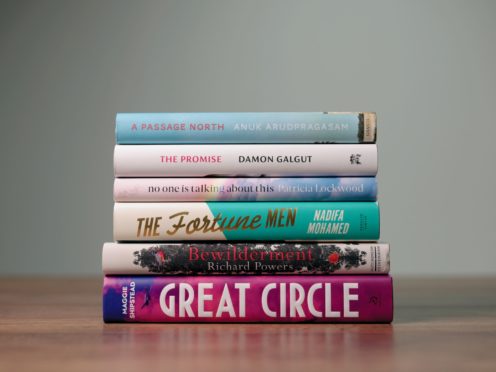The six books shortlisted for the prestigious 2021 Booker Prize for fiction explore themes including racism, injustice, freedom and constraints on women’s lives.
The only shortlisted author of British descent is Somali-British novelist Nadifa Mohamed for The Fortune Men.
She is up against three Americans, one Sri Lankan and one South African.

The American-authored novels are No One Is Talking About This by Patricia Lockwood, Richard Powers’ Bewilderment and Maggie Shipstead’s Great Circle, which are up against Sri Lankan Anuk Arudpragasam’s A Passage North and The Promise by South African author Damon Galgut.
This is the third time Galgut has featured, having made the shortlist in 2003 with The Good Doctor and again in 2010 for In A Strange Room.
The judges announced a longlist of 13 books in July, chosen from 158 novels published in the UK or Ireland.
Works written in English by writers of any nationality are eligible for the prize.
Sir Kazuo Ishiguro featured on the longlist but failed to make the cut, missing out on becoming a double winner of the prize with his eighth novel, Klara And The Sun.

The shortlist, announced at a digital press conference on Tuesday, was chosen by judges including historian and panel chairwoman Maya Jasanoff and former archbishop of Canterbury Rowan Williams.
Asked what conclusions can be drawn about the state of British writing, given only one British writer was shortlisted, judge Chigozie Obioma added: “For me, I think the Booker Prize is the great leveller.
“If you think about some of the writers that we longlisted, say An Island, for instance, or even A Passage North, these are writers telling stories that don’t make the news.
“I don’t think that you would hear about the life of a poor woman in Sri Lanka, or a man who is marooned on an island off the coast of Africa.

“But while judging the Booker Prize we look at not just what the writers are saying, but how they are saying it, and therefore nationalities do not really matter.
“What matters is what the writer has brought to the page, and the vision that they have and how they have realised.
“So if we don’t have many British writers, I think, it’s just a coincidence, not something that we intentionally had made a conscious decision of.”
Discussing Galgut’s novel, Obioma added: “His novel was one of the first ones we read, I think, but we were immediately struck by what seemed, at first, a little bit odd but later on crystallised to be actually a kind of a renewal of what we used to think of as the omniscient voice.

“So here you have a narrator who is super intrusive and extraordinarily penetrating into the consciousness of characters.”
Obioma described the narrative style as balancing between “Nabokovian precision” and “Faulknerian exuberance”.
Jasanoff said Great Circle was “as absorbing in the manner of the great realist novels of the 19th century, but it also speaks to ever-present questions about freedom and constraints, particularly in women’s lives, as some of my fellow judges remarked upon”.
“And we felt that it was kind of a ‘tour de force’ of scene creation and prose style which earned it its place on this shortlist,” she added.

During a live Q&A on YouTube, in which members of the public could pose their questions about the shortlist to the judging panel, Jasanoff explained that the books are reread at every stage of the shortlist process, so the winning novel will have been read three times by the whole judging panel before being crowned.
She added: “I think that this kind of replicates the process of whether or not a book stands the test of time as we’re reading it at these different timescales and we’re reading it over and over.”
When asked what the motivation was for choosing the longlisted and shortlisted books, fellow judge, Horatia Harrod, added: “Each book we tried to consider on its own merits.

“So every time we opened a book we had this sense that this could be the winner, and that we would take it on its own terms, and then thoroughly kind of analyse whether we think it hit the notes that it was trying to hit.
“So I guess the truth is, we try to take an open-minded approach.”
The winner will be announced on November 3 and will be broadcast live on BBC Radio 4’s Front Row, BBC iPlayer and the BBC News Channel.
The winner of the 2021 Booker Prize receives £50,000.
